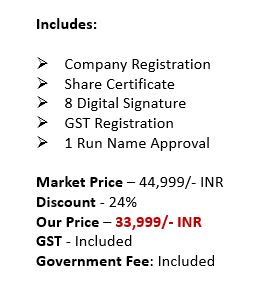- Basic
Enquire Us
Nidhi Company
A Nidhi Company is a type of non-banking financial company (NBFC) that is formed for the purpose of promoting the habit of thrift and savings among its members. Nidhi Companies are regulated by the Ministry of Corporate Affairs (MCA) under the Companies Act, 2013 and the Nidhi Rules, 2014.
The primary objective of a Nidhi Company is to borrow and lend money to its members, which are also referred to as shareholders or depositors. The funds mobilised by a Nidhi Company are used for the mutual benefit of its members, and the company is not allowed to carry out any other financial activities such as accepting deposits from non-members.
Nidhi Companies are required to have a minimum of 200 members, and each member must hold a minimum of 10 equity shares or Rs. 100 per share. Nidhi Companies are not allowed to issue preference shares, debentures, or any other debt instruments.
Nidhi Companies are also required to maintain a certain level of reserves, including a minimum of 10% of the deposit amount in a fixed deposit account and a minimum of 20% of the net profits as a general reserve. Nidhi Companies are also required to file various financial and non-financial reports with the Registrar of Companies (ROC) and comply with other regulatory requirements.
Key Regulatory Restrictions Applicable to Nidhi Companies in India
Here are some of the basic restrictions that apply to Nidhi Companies in India:
- Acceptance of Deposits: Nidhi Companies are allowed to accept deposits only from their members and are prohibited from accepting deposits from the general public or non-members.
- Lending Activities: Nidhi Companies are allowed to lend money only to their members and are prohibited from engaging in any other type of lending activity. Nidhi Companies are also not allowed to offer any form of secured or unsecured loans to their members.
- Investment Restrictions: Nidhi Companies are allowed to invest their funds only in certain permissible activities such as fixed deposits, government securities, and mutual funds. Nidhi Companies are prohibited from investing in speculative or risky activities such as derivatives, stocks, or futures.
- Membership Restrictions: Nidhi Companies are required to have a minimum of 200 members at all times and are prohibited from admitting any corporate or institutional members. Nidhi Companies are also required to ensure that their members hold a minimum of 10 equity shares or Rs. 100 per share.
- Branch Network Restrictions: Nidhi Companies are prohibited from opening more than three branches in a single district, and they are not allowed to open any branches outside their home district.
- Regulatory Compliance: Nidhi Companies are required to comply with various regulatory and legal requirements, including the filing of various reports and returns with the Registrar of Companies (ROC), maintenance of a certain level of reserves, and periodic inspection by the regulatory authorities.
Non-compliance with any of these restrictions can result in penalties, fines, and even cancellation of the Nidhi Company’s registration. Therefore, it is important for Nidhi Companies to ensure strict compliance with all the applicable regulations and restrictions.
Step-by-Step Guide to Register a Nidhi Company in India
The registration process for a Nidhi Company in India involves the following steps:
Step 1: Obtain Digital Signature Certificate (DSC) and Director Identification Number (DIN): The first step is to obtain a DSC and DIN for all the proposed directors of the Nidhi Company. The DSC and DIN can be obtained by submitting an online application to the Ministry of Corporate Affairs (MCA).
Step 2: Name Reservation: The next step is to apply for the reservation of the company name with the MCA. The name of the Nidhi Company must include the words “Nidhi Limited” as the last words.
Step 3: Preparation of Incorporation Documents: Once the name is reserved, the next step is to prepare the incorporation documents such as the Memorandum of Association (MOA) and Articles of Association (AOA) of the company.
Step 4: Incorporation Application: After the documents are prepared, the application for incorporation of the Nidhi Company can be submitted online to the MCA along with the necessary fees and documents.
Step 5: Certificate of Incorporation: If the MCA is satisfied with the application and the documents, it will issue a Certificate of Incorporation for the Nidhi Company. The Nidhi Company can start its operations after receiving the Certificate of Incorporation.
Step 6: Apply for PAN and TAN: After receiving the Certificate of Incorporation, the Nidhi Company must apply for a Permanent Account Number (PAN) and Tax Deduction and Collection Account Number (TAN) with the Income Tax Department.
Step 7: Bank Account Opening: The final step is to open a bank account in the name of the Nidhi Company with a scheduled bank.
It is important to ensure strict compliance with all the applicable laws and regulations during the registration process and thereafter to avoid penalties and legal issues. Therefore, it is advisable to seek professional assistance to ensure compliance with all the regulatory requirements.
Overview of the Nidhi Amendment Rules, 2020 in India
The Nidhi Amendment Rules, 2020 were introduced by the Ministry of Corporate Affairs (MCA) to amend the Nidhi Rules, 2014. The key amendments made by the Nidhi Amendment Rules, 2020 are:
- Increase in Net Owned Funds: The minimum net owned funds required for a Nidhi Company has been increased from Rs. 10 lakhs to Rs. 20 lakhs. This means that the Nidhi Company must have a minimum capital of Rs. 20 lakhs at all times.
- Increase in Unencumbered Deposits: The Nidhi Company is now required to maintain unencumbered deposits of at least 10% of its outstanding deposits. This is an increase from the previous requirement of 5%.
- Prohibition on Branch Opening: A Nidhi Company can open new branches only if it has earned a net profit after tax continuously for the preceding three financial years.
- Introduction of Nidhi Deposit Insurance Scheme: The Nidhi Amendment Rules, 2020 introduced a Nidhi Deposit Insurance Scheme to protect the interests of depositors in case of default by the Nidhi Company. The scheme provides insurance cover of up to Rs. 5 lakhs per depositor.
- Restrictions on Dividend Distribution: The Nidhi Company is now required to maintain a minimum reserve of 20% of its net profits before declaring any dividend to its members. The Nidhi Company can distribute a dividend of only up to 25% of its net profits after transferring the minimum reserve to the statutory reserve.
These amendments are aimed at strengthening the regulatory framework for Nidhi Companies in India and ensuring the protection of the interests of depositors. It is important for Nidhi Companies to ensure compliance with all the applicable rules and regulations, including the Nidhi Amendment Rules, 2020.
Related Guides
ITR Services
Other Services
Documents Required
- PAN Card
- Passport (Foreign Nationals Only)
- Voters Identity Card
- Ration Card
- Driving License
- Electricity Bill
- Telephone Bill
- Aadhaar Card
- Bank Statement
- Passport Size Photo
- Recent Utility Bill
- Business Place

